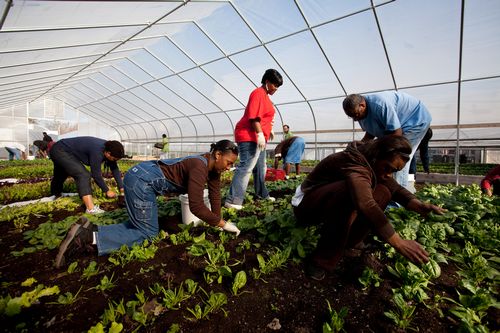|
Friday, January 27th
by Daniel Green
Transforming Lives, One Growing Season at a Time
As we know, growing your own food can help you develop a sense of self-sufficiency, productivity, and joy. But a Chicago-based non-governmental organization is showing that it can also transform lives in ways that help individuals and communities get out of poverty.
“Growing Home†was founded in 1996 by Les Brown whose mission was to operate and promote organic agriculture as a vehicle for job training, job creation and community development.
The program offers interns a 13-week training course which not only pays participants for growing crops, but also offers them lessons on agriculture, how to make an effective résumé, and maximize internet job searches.
Growing Home takes interns who might have experienced a variety of barriers to employment. Some may have been homeless, or have just completed alcohol or drug treatments. Some have criminal records. For others it’s all of the above.
The organization’s development director, Polly Washburn, says that specific qualifications are not important when they select their interns. Instead, they’re just looking for people who are willing to work on a farm and are ready to get back on the job search.
Today, Growing Home operates four organic farms: three in inner-city Chicago, and one nearby in Marseilles, Illinois.
Its Executive Director, Harry Rhodes spoke about the NGO’s work in the neighbourhood of Englewood, a community into which the organization was invited by the city.
Rhodes says that Englewood is a neighbourhood that particularly struggles with poverty, and non-coincidentally, has a high crime rate.
About a quarter of Englewood’s residents are unemployed compared to just over one in ten for the rest of the city. Nearly half of its residents are below the poverty line at 44 per cent.
The old railroad side community of 100,000 residents shrunk to just over 60,000 people after a period of divestment. Today, the community has only two supermarkets.
Lacking access to fresh food made Englewood a perfect candidate for Growing Home to purchase a plot of land for an urban farm. The land happened to be an unused former industrial site which the city sold to Growing Home for $1.00 as part of a community development strategy.
Today, about 1200 pounds of vegetables are grown each year on the plot measuring an acre in size.
Although Growing Home relies on private and government grants for the bulk of its funding, Polly Washburn said she hopes that one day the farms will be self-sustaining by food sales, which in 2010 accounted for nearly 13 per cent of the NGO’s overall revenue. However, for the organization’s other activities such as job training, she expects it to continue to rely on the largesse of other parties.
Only a fraction of Growing Home’s graduates go on to employment in agriculture, but many do go into related fields such as landscaping and food preparation.
She said the interns boast an 85-90 per cent graduation rate and that she aims for 75 per cent of them to be employed after completion.
But probably the best way to measure the program’s success is to take an account of a person whose life was changed through her experiences as an intern:
“I was so ready to be done with the bad parts of my life. Growing Home has helped. It’s peaceful here. It’s an indescribable feeling to get up every day and make conscious decision to focus on the positive.â€
---Jasmine, program graduate

Source: Photo: Courtesy of Growing Home
|
Recent posts

Soiled and Seeded's summer 2013 issue is in the works
|

Welcome to Soiled and Seeded's Eighth Edition
|

A Good Day's Work
|

Call for Submissions
|

Plant Portraits
|

Filling up the Gaps! "Holes of Happiness"
|

The Winter 2012 Edition of Soiled and Seeded is OUT!
|

Upcoming
|
|